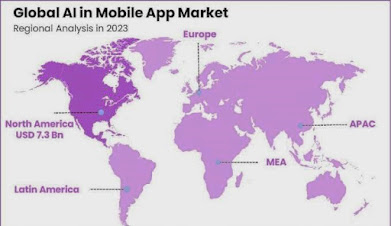Demand for Mobile Apps Is Expected to Reach USD 251.1 Billion by 2033
Introduction
Artificial intelligence (AI) has been identified as a competitive factor in a number of businesses in recent years. The market for mobile apps is one of the most prominent sectors going through this change. The incorporation of artificial intelligence (AI) technologies into mobile applications represents a fundamental advance in app development and usage, rather than merely a fad. Recent estimates indicate that by 2033, the market for artificial intelligence (AI) in mobile apps is expected to grow rapidly to USD 251.1 billion. What, though, is behind this rapid expansion, and what does it portend for mobile applications going forward?
The combination of mobile applications and artificial intelligence (AI) is changing the digital landscape and driving the market to previously unheard-of heights. With the market demand expected to reach an astounding USD 251.1 billion by 2033, the integration of AI in mobile apps is anticipated to produce a seismic shift as technology continues to progress at a quick pace. This number represents a seismic shift in the way we use technology, not just a trend. It opens up new possibilities and capacities that were previously only found in science fiction.
AI and Mobile Apps:
A Dynamic Pair Artificial intelligence is quickly taking the lead in generating innovations that improve user experience, expedite processes, and open up new possibilities in modern mobile applications. Many of the things we currently take for granted, including clever virtual assistants and personalized suggestions, are powered by artificial intelligence. Here's how artificial intelligence is transforming the market for smartphone apps:
Improved User Experience: To provide extremely tailored experiences, AI systems examine user behavior and preferences. Predictive text input, personalized content recommendations, and user-friendly interfaces that adjust to user preferences are a few examples of this.
Improved User Experience: To provide extremely tailored experiences, AI systems examine user behavior and preferences. Predictive text input, personalized content recommendations, and user-friendly interfaces that adjust to user preferences are a few examples of this.
https://duniyajagat.in/
Superior Customer Service: AI-powered chatbots and virtual assistants offer round-the-clock customer service, answering questions, resolving problems, and even assisting with purchases. Both operational efficiency and user happiness increase as a result.
Intelligent Automation (AI): AI frees humans to concentrate on more strategic duties by automating repetitive processes like scheduling and data entry. This results in quicker processing times and a decrease in human error in sectors like banking and healthcare.Enhanced Security:
By spotting and reacting to any attacks instantly, artificial intelligence (AI)-driven security features like biometric authentication and anomaly detection strengthen app security.
Innovative Features:
Augmented reality (AR), fueled by artificial intelligence (AI), revolutionizes how people engage with digital material by providing immersive gaming, shopping, and educational experiences.
The demand for mobile apps with AI integration is rising for a number of reasons:
Increasing Smartphone Penetration: As smartphones proliferate, there is an increasing need for sophisticated and user-friendly applications. Apps with AI enhancements are more valuable to users, which boosts their uptake.
Prospects & Trends for the Future
In the future, a number of factors are probably going to influence how AI is used in mobile apps:
Growing Use of Virtual Reality (VR) and Augmented Reality (AR): AI will be essential to improving these experiences.
Growth of Edge AI: Edge AI, or the processing of AI algorithms directly on devices, will boost performance and lower latency.
Increased Emphasis on AI Ethics: As AI technologies are used, there will be a greater emphasis placed on ethical AI activities.
The addition of artificial intelligence (AI) to mobile apps changes the game, not just makes it better. Given that the market for mobile applications powered by artificial intelligence is expected to grow to USD 251.1 billion by 2033, it is obvious that AI will play a significant role in determining the direction that mobile technology takes. The developments and enhancements that artificial intelligence (AI) will bring to the mobile app market will be advantageous to users, developers, and businesses alike.
Market Trends and Drivers
The demand for mobile apps with AI integration is rising for a number of reasons:Increasing Smartphone Penetration: As smartphones proliferate, there is an increasing need for sophisticated and user-friendly applications. Apps with AI enhancements are more valuable to users, which boosts their uptake.
Prospects & Trends for the Future
In the future, a number of factors are probably going to influence how AI is used in mobile apps:Growing Use of Virtual Reality (VR) and Augmented Reality (AR): AI will be essential to improving these experiences.
Growth of Edge AI: Edge AI, or the processing of AI algorithms directly on devices, will boost performance and lower latency.
Increased Emphasis on AI Ethics: As AI technologies are used, there will be a greater emphasis placed on ethical AI activities.




.jpg)
.jpg)



.jpeg)
